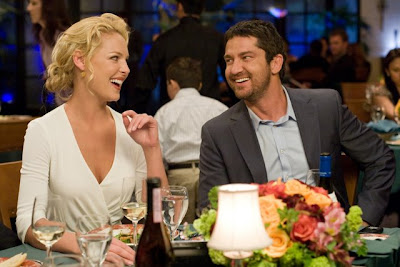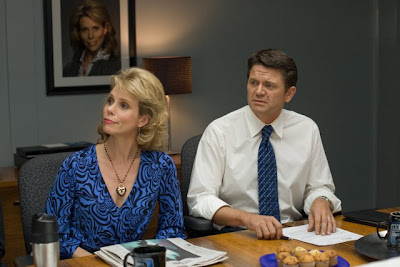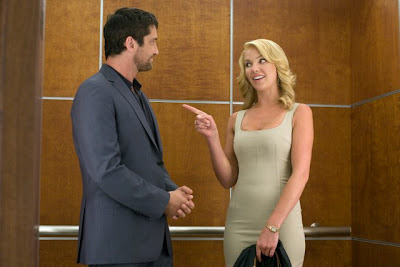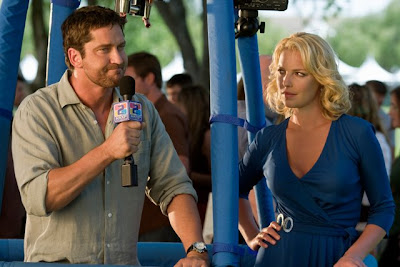Now Available on DVD & Blu-ray
View a Slideshow
Pick a Side:
Katherine Heigl
Gerard Butler
Bookmark this on Delicious
Print Page
Whether they're deemed "chick flicks" or the now trendier "rom-coms," I think I understand one of the reasons that first men and now women have started to stay away from the genre in droves. And that is that aside from the smash success of Sandra Bullock and Ryan Reynolds' hit The Proposal-- it's because whether they're titled Bride Wars, He's Just Not That Into You, Ghosts of Girlfriends Past, or any number of variations, once you've seen one, you've usually seen 'em all.
And this is a shame since romantic comedies or in particular-- screwball romantic comedies-- where men and women speak a mile a minute equally matched in love and loathe throughout with fiery flirtation are one of my favorite genres and one of the most inspiring to me as a writer.
I catch glimpses of that wit now and again-- most recently evidenced in Magnolia's brilliant art-house festival favorite The Answer Man starring Jeff Daniels and Lauren Graham which is also opening this weekend following a video on demand presentation. Additionally it's also around in a few other comedies like Adrienne Shelley's Waitress that have also broken the mold but it's pretty rare.
While The Ugly Truth doesn't even begin to break the mold or any new ground, what it does do is rework the same cardboard cut-outs or cliched male and female types we're typically presented with in these films. Namely in one corner we have the control-freak female looking for Mr. Right in a role beautifully played by the beaming yet guileless risk-taking girl-next-door Katherine Heigl. So out of necessity, in the other corner, there's the beyond stereotypical playboy cad who even Sean Connery's version of James Bond may have felt like punching in the face, nicely portrayed by Connery's fellow Scottish countrymen, Gerard Butler.
Thus these over-used characters from the-- "man, they hate each other so much that inevitably this passion will explode into red hot romantic lust" dynamic are used as a starting point. And it's achieved via Legally Blonde screenwriters Karen McCullah Lutz and Kirsten Smith (who owed us a good movie after last year's House Bunny debacle) by attempting to make Nicole Eastman's story idea and first draft much snappier by going for the same extremes we would've found in the screwball era and in doing so they're somewhat successful and somewhat completely off-the-mark.
Of course, it does "screwball" without the class of an Irene Dunne and Cary Grant picture. For Grant would never have told Dunne that the only way to snare a man is with two particular body parts and by utilizing one act for which a certain former president almost received impeachment. And while you have no doubts you know exactly where it's headed as it spirals into a long conclusion that should've ended in a hotel instead of a CGI hot air balloon (don't ask), it's a damn sight more fun than most by-the-numbers studio genre pictures we've seen so far this year. Moreover, it's light-years better than the shudder-inducing Ghosts of Girlfriends Past which was so bad it actually disturbs me more than ads for the new movie Orphan.
Employing the requisite simple yet illogical premise of a rom-com, we're introduced to Heigl's award-winning Sacramento television morning show producer Abby Richter who explains that the secret to her success is "looking chaos right in the eye and telling it to 'eff' off," using her same ultra prepared manner at the workplace as in her dating life. This is evident from the start wherein she prints off a man's dating profile and runs a background check, further providing him with talking points and urging that they just go directly to number three after the conversation inevitably gets off to a shocked start.
Following the lackluster date, Heigl returns to her solo apartment to find that her cat has tuned into The Ugly Truth, the local public access show hosted by Butler's Mike Chadway where he spouts his own brand of misogynistic, chauvinistic logic that all women need to get a man is a StairMaster. One of those guys who shoots outward for humor-- Mike further philosophizes that women should burn their self-help books (however, I do agree with this one), and if they aren't seeing anyone... well, then, they're just plain ugly. And while admittedly that's lame, you can't exactly pretend you've never heard some men say this a million times before in their "it's all women's fault" rant.
Provoked by both a bad date and Chadway's insistence in the idea that his ridiculous shock-jock opinions should be held-up as facts (in a society where-- let's face it-- people do consider the opinions of people like Lou Dobbs, the nuts on Fox News Channel, Howard Stern and everyone in between as factual sources), Abby calls in to prove him wrong and defend her idea of the perfect guy who does believe in love. However, when he calls her bluff that he's imaginary, he calls her "Lassie" and ends the conversation.
Obviously, in real life the exchange would've ended there since as a public access host, he's not on a network that can get sued... until Abby discovers that to boost her sagging ratings, they've decided to bring Chadway on board a few times a week as a commentator to spice things up. And horror of horrors, the audiences love the sensationalism-- especially when he turns his negative views on marriage directly on married co-anchors Cheryl Hines and John Michael Higgins (hilarious as always).
While inevitably, Mike realizes that Abby was the woman who phoned in and takes back his "ugly" comment when he harasses her in front of the rest of the station, the two get off on a bad start, only to discover that they have to work together despite their differences and move it into the personal arena when Abby does meet a new neighbor (Eric Winter) who may in fact be Mr. Right. In another illogical-- only in the movies turn of events-- she employs Mike's help as a sort of "deal" not to blow it the way she's ruined every other date.
Sure enough their animosity grows into friendship and attraction as we begin to see other sides to Mike including his unexpected (to anyone who hasn't seen a rom-com, that is) sensitive side where his nephew is concerned. And while they take some of the shocking antics of Mike's confrontational verbal style into the visual realm with women wrestling in jello and one hilarious if dubious technological update of Meg Ryan's Harry Met Sally restaurant orgasm scene featuring a helpless Heigl-- all in all, despite its contrivances there's still a lot to like about the film no matter how hard we want to resist.
Intriguingly though, it's only Mike who is at least given the opportunity to be at least a bit more unmasked as the movie goes on even though poor Butler slips in and out of his Scottish accent briefly throughout. To this end, there's still some lingering questions we have about Heigl's Abby and perhaps why her need to be perfect or in control reigns supreme that I felt were ignored in favor of just asking us to simply buy into the workaholic female stereotype as opposed to exploring her on the same level as Mike.
Still, in lieu of this flaw of managing to improve on one traditional cardboard cut-out at the sacrifice of another (more or less although Heigl's charm helps endear her to us)-- the script again is still far easier to accept and root for than other recent works. Namely, the more serious offenders would be the women written into Bride Wars as well as the passive heroine of Ghosts of Girlfriends Past who would've been much better off solo than with a leading man so unlikable I wouldn't have cared whether or not his character had been hit by a bus.
Following a reschedule from its previous April opening date and coming off the heels of the success of the more all-ages viewer friendly Proposal as well as hitting theatres post-Potter and coinciding with the expansion of the unorthodox romantic sleeper (500) Days of Summer, The Ugly Truth may well be affected attendance-wise. And while it isn't perfect, Ugly Truth at least will manage to keep men awake more them some of the recent studio made rom-coms that have come before it, if only because you'll be in constant shock at the ridiculous things Butler manages to say with a straight face.
Text ©2009, Film Intuition, LLC; All Rights Reserved. http://www.filmintuition.com
Unauthorized Reproduction or Publication Elsewhere is Strictly Prohibited.





























